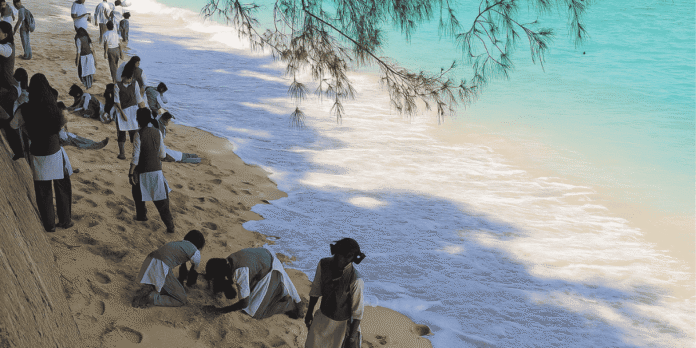A simple, child-friendly idea from one of India’s remotest corners, a government school in Katchal, Nicobar Islands, made a lasting impression at the recent BRICS Education Meeting held in Brasília, Brazil. The concept, called “Bagless Day,” was showcased as part of India’s presentation and received an enthusiastic response from participating nations.
The initiative was highlighted by Shalia Shah, drawing attention to how even small schools in remote geographies are embracing the spirit of the National Education Policy (NEP) 2020. A video shared during the presentation captured the essence of the effort: students engaging in hands-on learning activities, free from the physical and psychological burden of carrying schoolbags.
Dr. Shalia Shah is a 2012-batch officer of the Indian Forest Service, and a native of the Andaman and Nicobar Islands. She has a distinguished career in both environmental stewardship and educational policy. She served on central deputation in the Ministry of Higher Education and currently functions as a Deputy Secretary within the Ministry of Education’s International Cooperation Cell – helping coordinate India’s outreach in international educational forums like BRICS. Her involvement in this initiative underscores the government’s focus on promoting inclusive and innovative practices.
“Bagless Day” is part of a wider recommendation in NEP 2020, which envisions at least 10 bagless days each year for students from Classes 6 to 8. These days are designed to promote experiential learning by shifting the focus from textbooks to practical activities like arts, field visits, science experiments, and vocational training. The idea is to break routine classroom monotony and introduce young learners to real-world knowledge and skills.
The example from Katchal stood out not just because of its alignment with national policy but because of where it came from, an island over 1,200 kilometers away from the Indian mainland. Its inclusion at a global platform such as the BRICS Education Meeting, held under Brazil’s presidency, signalled how grassroots innovations in education are beginning to resonate internationally.
The Indian delegation to the event, led by Armstrong Pame, Joint Secretary in the Ministry of Education, used the occasion to highlight several education-sector achievements. Among the initiatives that drew appreciation from BRICS member nations were SWAYAM Plus, aimed at skill-based online learning, and the National Apprenticeship Training Scheme (NATS), which connects students to industry experience.
But it was the low-tech, high-impact idea of a “Bagless Day” that captured the imagination of many delegates. Officials and educators present at the meeting commended India for promoting an education model that encourages creativity, inclusivity, and emotional well-being among students.
In a social media post following the presentation, Shah noted how the Bagless Day concept made learning more engaging and child-centric, especially in under-resourced areas. “It’s inspiring to see how even the most remote schools are leading by example,” the post read.
The recognition at BRICS serves as validation for grassroots educators who are implementing national policies in unique ways. It also reflects India’s growing emphasis on vocational, skill-based, and real-world learning under NEP 2020, a shift from rote memorization to learner-led engagement.
For the students of Katchal, a day without bags is more than just physical relief; it’s a chance to discover, explore, and learn with joy. And now, that small island school’s idea has found a voice on an international stage.





